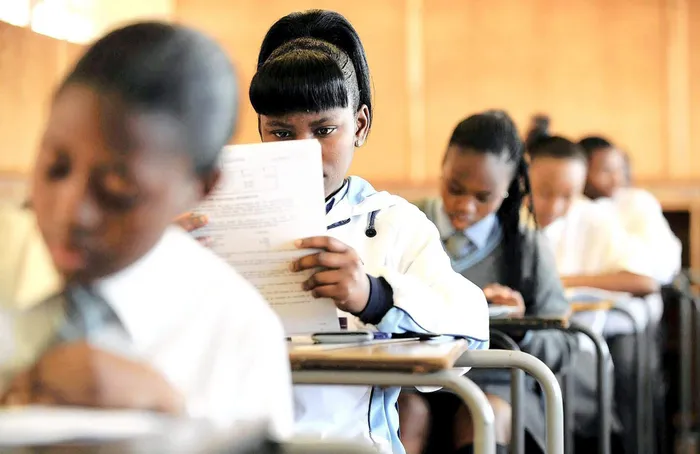The matric class of 2021, impacted by 2 years of Covid-19 disruptions, urged to have a learning plan

With just a month to go before the matric class of 2021 sit for their final exams, an education expert has urged pupils to follow a learning plan and to take advantage of support resources available to them Students writing their matric exams at the Sena-Marena High School in Soweto. File Picture: Chris Collingridge
DURBAN - WITH just a month to go before the matric class of 2021 sit for their final exams, an education expert has urged pupils to follow a learning plan and to take advantage of support resources available to them.
The Department of Basic Education announced earlier this month that the matric class of 2021 would begin writing their exams on October 27.
Asked about final exam preparations yesterday, Basic Education spokesperson Elijah Mhlanga said the department would soon publish details regarding the preparations for the exams.
“At the moment, work is being done to address the outstanding issues related to the exam administration,” he said.
Mhlanga said pupils who tested positive for Covid-19 ahead of an exam and were able to write would follow the same procedure as last year.
In a joint statement last year, the Departments of Basic Education and Health agreed to allow candidates who test positive for Covid-19, who are deemed fit to write the exam, to write the exam at a different venue under secure conditions that are in compliance with the examination regulations.
This decision followed a request by pupils and parents for the initial protocol not to allow pupils who test positive to sit for the exam to be reviewed.
The matric class of 2021 have had both their Grade 11 and Grade 12 years affected by Covid-19 disruptions which has raised concerns about how well they will cope with the final exams.
National Association of School Governing Bodies general secretary Matakanye Matakanya, said the pass rate might drop.
He appealed for pupils and teachers to be supported.
“Please let’s all support these learners and teachers. It is difficult for them. Parents must particularly excuse learners from their daily routine to get a space to concentrate on their work.”
Professor Labby Ramrathan, director of the School of Education Studies at the University of KwaZulu-Natal, said taking into consideration the on-going disruptions to schooling and the disadvantage that this cohort of pupils had experienced in 2020, he expected the matric pass rate to be a bit lower than last year.
He said the decrease could be within a 5% margin.
Ramrathan added that the pass rate was expected to be slightly lower despite there being additional support to matric pupils through various sources.
He advised pupils to dedicate sufficient time to learning.
“Learners are advised to follow a learning plan and to spend as much hours as possible on their learning, while continuing to take advantage of support opportunities that are made available to them,” said Ramrathan.
He added that those pupils, who are largely independent, will not have been affected by the school closures as they spend a substantial amount of time focusing on their studies but others who rely heavily on school for their learning needs may not perform as well.
Ramrathan said the annual adjustments of raw marks would also assist in reducing the performance gap between last year and this year in terms of pass rates.
THE MERCURY
Related Topics: